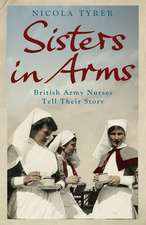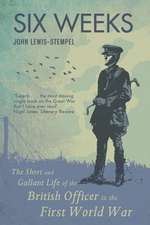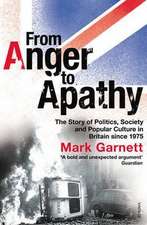At Home and under Fire: Air Raids and Culture in Britain from the Great War to the Blitz
Autor Susan R. Grayzelen Limba Engleză Paperback – 26 feb 2014
| Toate formatele și edițiile | Preț | Express |
|---|---|---|
| Paperback (1) | 422.47 lei 6-8 săpt. | |
| Cambridge University Press – 26 feb 2014 | 422.47 lei 6-8 săpt. | |
| Hardback (1) | 778.27 lei 6-8 săpt. | |
| Cambridge University Press – 8 ian 2012 | 778.27 lei 6-8 săpt. |
Preț: 422.47 lei
Nou
Puncte Express: 634
Preț estimativ în valută:
80.85€ • 83.93$ • 67.41£
80.85€ • 83.93$ • 67.41£
Carte tipărită la comandă
Livrare economică 22 martie-05 aprilie
Preluare comenzi: 021 569.72.76
Specificații
ISBN-13: 9781107679412
ISBN-10: 1107679419
Pagini: 356
Ilustrații: 15 b/w illus.
Dimensiuni: 152 x 229 x 20 mm
Greutate: 0.52 kg
Editura: Cambridge University Press
Colecția Cambridge University Press
Locul publicării:New York, United States
ISBN-10: 1107679419
Pagini: 356
Ilustrații: 15 b/w illus.
Dimensiuni: 152 x 229 x 20 mm
Greutate: 0.52 kg
Editura: Cambridge University Press
Colecția Cambridge University Press
Locul publicării:New York, United States
Cuprins
1. Modern war and the militarization of domestic life; 2. Destroying the innocent: the arrival of the air raid, 1914–16; 3. Redefining the battlezone: responding to intensified aerial warfare, 1917–18; 4. Writing and rewriting modern warfare: memory, representation, and the legacy of the air raid in interwar Britain; 5. Inventing civil defense: imagining and planning for the war to come; 6. Trying to prevent the war to come: efforts to remove the threat of air raids; 7. Facing the future of air power: responding to interwar air raids; 8. Preparing the public for the next war: the expansion of air raid precautions; 9. Protecting the innocent: gas masks and the domestication of air raid precautions; 10. Responding to the air war's return: the militarized domestic sphere from Munich to the Blitz; 11. Representing the new air war: morale and the domestication of the air raid in wartime popular culture; 12. Conclusion: air raids and the domestication of modern war.
Recenzii
'Professor Grayzel shows that in order to understand the real impact of the Blitz, it is important to go back a quarter of a century to the first aerial assault on Britain. Drawing on a vast range of sources and utilizing the theoretical sophistication of a historian at the height of her powers, At Home and Under Fire also manages to make us recognize once more the unprecedented shock of death from above and engages our sympathy with the people first caught under the bombs.' Dr Adrian Gregory, University of Oxford
'Throughout the twentieth century, and into the twenty-first, civilians have been the subject of aerial bombardment as combatant nations and groups have sought to win conflicts by inflicting death and injury on those at home 'behind the lines'. In this riveting study Susan Grayzel traces the origins of this all-too-familiar form of warfare back to the early twentieth century, showing the impact of aerial warfare on the home and on those within. Exploring the responses to this new threat to personal and national security from the state, the media, and individuals, this is truly a book for our times.' Lucy Noakes, University of Brighton
'At Home and Under Fire is an exhaustively researched and illuminating analysis of the impact of air warfare on Britain in the twentieth century. Grayzel thoughtfully analyzes the political and cultural responses to and consequences of the bombing in World War I, examining the policy and public debates at the time and in the war's aftermath. She clearly demonstrates how weapons from the skies used against British civilians beginning in 1914 shaped interwar debates about controlling war, protecting civilian lives, and preparing for the war to come, and how these, in turn, informed responses to the massive attacks from the air in World War II. The book significantly enriches our understanding of the nature and consequences of 'Total War'.' Sonya O. Rose, Professor Emerita, University of Michigan
'Susan Grayzel now offers a wider perspective on the impact of the bombing of civilians, by explaining the ways in which everyday life was first 'militarized' by the attacks in the First World War. [She] effectively illustrates how the extension of the scale of conflict significantly affected the British people's attitude to the state, and how they subsequently became far more tolerant of its intervention in their daily lives.' Ian Cawood, The Times Literary Supplement
'[Grayzel's] book is a major achievement, providing us with a complexly argued and exhaustively researched account of British responses to the threat of aerial attack, one that illuminates the vital role of gender in how war was imagined and anticipated.' Geoffrey Field, Twentieth Century British History
'Because of German attacks it was Britain that first had to cope with 'total war' and this book will greatly aid our understanding of how this important development occurred.' Contemporary Review
'This detailed, well-written book chronicles the cultural transformation wrought by the air raid, in reality and in the British imagination, between the early Zeppelin raids of the First World War and the end of the Blitz in the Second … This is an exemplary monograph: deeply researched, attentive to the production and reception of culture, and elegantly argued. Its main claim is convincing, and its de-emphasizing of the uniqueness of the reaction to the Blitz is important.' Journal of British Studies
'Throughout the twentieth century, and into the twenty-first, civilians have been the subject of aerial bombardment as combatant nations and groups have sought to win conflicts by inflicting death and injury on those at home 'behind the lines'. In this riveting study Susan Grayzel traces the origins of this all-too-familiar form of warfare back to the early twentieth century, showing the impact of aerial warfare on the home and on those within. Exploring the responses to this new threat to personal and national security from the state, the media, and individuals, this is truly a book for our times.' Lucy Noakes, University of Brighton
'At Home and Under Fire is an exhaustively researched and illuminating analysis of the impact of air warfare on Britain in the twentieth century. Grayzel thoughtfully analyzes the political and cultural responses to and consequences of the bombing in World War I, examining the policy and public debates at the time and in the war's aftermath. She clearly demonstrates how weapons from the skies used against British civilians beginning in 1914 shaped interwar debates about controlling war, protecting civilian lives, and preparing for the war to come, and how these, in turn, informed responses to the massive attacks from the air in World War II. The book significantly enriches our understanding of the nature and consequences of 'Total War'.' Sonya O. Rose, Professor Emerita, University of Michigan
'Susan Grayzel now offers a wider perspective on the impact of the bombing of civilians, by explaining the ways in which everyday life was first 'militarized' by the attacks in the First World War. [She] effectively illustrates how the extension of the scale of conflict significantly affected the British people's attitude to the state, and how they subsequently became far more tolerant of its intervention in their daily lives.' Ian Cawood, The Times Literary Supplement
'[Grayzel's] book is a major achievement, providing us with a complexly argued and exhaustively researched account of British responses to the threat of aerial attack, one that illuminates the vital role of gender in how war was imagined and anticipated.' Geoffrey Field, Twentieth Century British History
'Because of German attacks it was Britain that first had to cope with 'total war' and this book will greatly aid our understanding of how this important development occurred.' Contemporary Review
'This detailed, well-written book chronicles the cultural transformation wrought by the air raid, in reality and in the British imagination, between the early Zeppelin raids of the First World War and the end of the Blitz in the Second … This is an exemplary monograph: deeply researched, attentive to the production and reception of culture, and elegantly argued. Its main claim is convincing, and its de-emphasizing of the uniqueness of the reaction to the Blitz is important.' Journal of British Studies
Notă biografică
Descriere
This book demonstrates how the legacy of Britain's first air raids helped prepare civilians for the Second World War.















